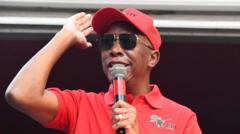Malema, the leader of the Economic Freedom Fighters (EFF) party, has made headlines within South Africa for controversial remarks regarding race relations and violence, including advocating for the arming of groups he supports. His comments about the "slaughter of white people" and calls for armed resistance have drawn severe criticism, leading the UK to label him as undesirable for entry. The EFF has responded to the sanction by condemning the UK’s decision, branding it as an act of cowardice and an attempt to limit free expression and democratic discourse.
This is not the first time Malema has faced obstacles regarding UK entry; he had previously been denied for submitting his application late. Nevertheless, the current decision is notably more substantive, indicating a permanent denial on the grounds of public safety. A British official confirmed to the BBC that he would not have the right to appeal this decision and would likely face future rejections as well.
As the international community watches Malema’s political journey, including his impact on race relations in South Africa, this refusal raises questions about his influence and the broader democratic process in the region.
For more updates on African news and politics, follow BBC Africa on social media platforms.
This is not the first time Malema has faced obstacles regarding UK entry; he had previously been denied for submitting his application late. Nevertheless, the current decision is notably more substantive, indicating a permanent denial on the grounds of public safety. A British official confirmed to the BBC that he would not have the right to appeal this decision and would likely face future rejections as well.
As the international community watches Malema’s political journey, including his impact on race relations in South Africa, this refusal raises questions about his influence and the broader democratic process in the region.
For more updates on African news and politics, follow BBC Africa on social media platforms.

















